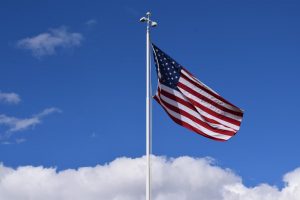The Pledge upholds common values that need not involve Christianity
March 3, 2021
Many avoid reciting the Pledge of Allegiance due to one word: “God”. It has been argued that this word violates their rights, specifically their First Amendment rights; however, the truth is that our nation — the United States of America — contains, in its very foundation, this one word and faith in God.
The word “God” can be seen in the early organizations of the government and in government today, from the Declaration of Independence to whether or not a person will tell the truth in court.
The Declaration of Independence was written to announce the separation of the American colonies from Great Britain. In the very first part of the document, it uses phrases like “Laws of Nature” and “Nature’s God”. Thomas Jefferson then goes on to state these famous words: “We hold these truths to be self evident, that all men are created equal, that they are endowed by their Creator with certain unalienable Rights.” The base of the very respected Declaration of Independence clearly states the words “God” and “their Creator”. While our constitution protects our right to exercise religion, this does not undermine our responsibility to honor our forefathers’ intentions and values.
Furthermore, when a witness is called up to testify in court, the witness places their hand on the Bible and swears to tell the truth and nothing but the truth. This is also a way to promise to value the beliefs of the Founding Fathers and how they believed the country should be run and its importance. Around the time of the creation of our nation, swearing upon the Bible was a much more earnest matter, for that individual would be swearing to God that you would tell the truth no matter what. Today it is still important because it illustrates the seriousness of telling the truth in court. It is an American tradition that symbolizes truth and honesty. Just as religious values push for truth and honesty, too. While the Bible may not be seen as the epitome of truth to others, it still represents uprightness and honor.
That’s not all. This faith in God shows up everywhere in the foundational concepts of the United States. This foundation, this word that is part of our Pledge of Allegiance, can be seen everywhere.
The Oath of Office requires a government official to place their left hand on the Bible and raise their right. According to Ben’s Guide (a lesson plan from the American Association of School Librarians), the president must place his or her left hand on the Bible and raise the right while saying, “I do solemnly swear that I will faithfully execute the office of President of the United States and will to the best of my ability, preserve, protect and defend the Constitution of the United States.”
This further demonstrates that God or something particularly religious should not be such an affront to individuals that they choose to disrespect a symbol of our nation. The Pledge of Allegiance does not force a church’s beliefs on states, governments, or schools; it only refers to the country’s original concepts.
The inherent problem with refusing to say the Pledge because it references God is that one would have a problem with the entire make-up of our country if that is their stance.
The Pledge is not a way of madly worshipping an object; it is a means of reminding us of our values. It is a way to adhere to our country’s founding beliefs.
Many that have strong religious beliefs and faith think of the Pledge as a way to pay tribute to God and how He is watching over and protecting people; however, standing for the Pledge of Allegiance can mean something different to others at the same time. The Pledge along with our flag are symbols of life, liberty, and the pursuit of happiness. This does not mean that the government is pressuring people to value the same beliefs; it is simply acknowledging the religious freedom we are so blessed to have.
Lastly, the unintended consequence of disallowing the Pledge because of reference to God in public schools is that it would disrupt a large portion of the American students in this form of practicing their faith. Not all religious students say the Pledge and think of their God every time, but many do.
This word “God” has been written in the very blueprints of our country. Its inclusion in the Pledge also gives respect to the similar morals of truth and honesty that our Founding Fathers valued. Through the Pledge of Allegiance, we acknowledge our forefathers’ intentions.












